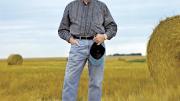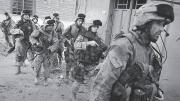Joseph B. Martin, dean of Harvard Medical School (HMS) from 1997 to 2007 and now Lefler professor of neurobiology, has written a memoir of Crimson interest on several levels. The title, Alfalfa to Ivy, refers to Martin’s journey from his roots on the family farm in Duchess, Alberta (where he is shown, blue-jeaned, in the cover photograph and above; the publisher is University of Alberta Press), to the helm of HMS. It offers, in its author’s characteristically steady voice, inside dope on, among other topics, the state of academic medicine in recent decades; major decisions—such as funding HMS’s New Research Building, Harvard’s role in the start-up of the Broad Institute to pursue genomic science, and rescuing the failing Beth Israel Deaconess Medical Center; and the alternately warm and chilly relations between the HMS dean and Harvard presidents, and between HMS and Faculty of Arts and Sciences deans.
Those enticements aside, Martin has something serious to say about the medical school within the University constellation. Much of what he writes may be principally of historical interest—but it would be well to keep in mind the ebbs and flows in the relationship between research and education in the realms of arts and sciences, on the one hand, and of professional medical research and training, on the other. The following excerpts come from chapter 9, “Working with Larry Summers,” and begin with the transition to Derek Bok’s return to Massachusetts Hall in mid 2006 (following Summers’s resignation as Harvard president).
On the eve of his interim term, I sent Derek a somewhat arrogant and, in retrospect, probably unnecessary missive making the case that the medical school was in a strong position at the end of Larry’s term and that as it moved forward, the University might benefit from looking at some of our accomplishments.…
In the letter to Bok, which I also shared with Jamie Houghton, the senior fellow of the Harvard Corporation, I lamented the fact that the Corporation knew very little about the inner workings and complexity of HMS and that most of the members of the Corporation had never set foot on our campus and had held very few meetings with me and my fellow deans. I was especially concerned that the planning strategies for the development of cross-university science that Larry had initiated in January 2006 were about to be implemented by taking away commitments made to HMS, such as the support for the new department of systems biology. I was also concerned that the Allston planning process as proposed by the University Planning Committee on Science and Engineering, an interfaculty committee that Larry had charged just six weeks before his announced resignation and that made its report public in June 2006, sought to take away many HMS initiatives and relocate them to Allston without concern about their impact on our planning.…
We will never know what might have become of Larry’s dream for a twenty-first-century Harvard, focused on life sciences and the contribution that new interfaces between the academy and industry might have produced.
The economic disasters that have ensued [including the 2007-2008 financial crisis and the resulting sharp decline in the endowment’s value] came to trump any such ambition under Harvard’s new administration. And so, in the spring of 2011, the Allston initiative was put on ice and the building of the first science Quad was on hold, unlikely to be resurrected in the next five years. The stem-cell institute headed for relocation to the northwest corner of the Harvard campus, as far from the medical school and its hospitals as it could possibly be. The initiative on bioengineering is located in a space at the medical school on the Longwood campus, a good location for those of us here in the medical world, but, once again, keeping separate the activities that Larry hoped would integrate our communities across the University.









